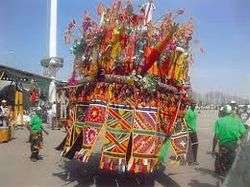Umuleri
Umuleri, also known and pronounced as Umu-ulu eri'
(Umuleri) (Okebo) | |
|---|---|
 Umuleri land | |
[1] Seal | |
| Coordinates: 6°19′N 7°52′E | |
| Country | Nigeria |
| State | Anambra |
| LGA | Anambra East |
| Population (2015) | |
| • Total | 100,000 |
| • Ethnicity | Igbo 70% Igala 30% |
| • Religion | Odinani |
| Time zone | UTC+1 (WAT) |
History
The origin of Umuleri is sourced from the natives of the town who believe in the oral tradition (as customary mode of transmission of knowledge in antiquity) that their clan was founded a man from Eddah named Okebo . This Oral tradition passed from generation to generation indicates that Umuleri ancestors are group of migrating clan from an unknown place, though of late research on their habitats, cultural practices and artifacts they left behind suggests a connection with the fleeing Eddah/Aro warriors of post Addah era. The Settlers that infiltrated into the land settled at a place as Ugume, Umudiana, Umunagu, Umunchezi, Amukwu and Mgbago and founded a clan called “Ikenga Umuleri” . Though the exact date, that they settled on the land was not known, many scholars were of view that it occurred around 940AD. It has been established that Umuatuolu Umuleri was the people that welcomed and settled Ugume and Umudiana people in Umuleri who served as Oru to Umuatuolu people before they were later give a piece of land to settle.
Division and administration
Traditionally, there are two classes of people in Umuleri – the Nwadiala and the Osu. The Nwadiala literally meaning ‘sons of the soil’ are the freeborn. They are the masters. While the Osu are the slaves, the strangers, the outcasts and the untouchables.
The pre-colonial Umuleri government under the influence of Bini Kingdom who ruled over Umuleri under the leadership of Oba of Benin.
Religion
Prior to the coming of Europeans, Umuleri people practiced Osu caste system which is an obnoxious practice among the Umuleri people and has refused to let the practice to go away despite the impact of Christianity, modern education and civilization, and the human rights culture.
Traditionally, there are two classes of people in Igboland – the Nwadiana and the Osu. The Nwadiala literally meaning ‘sons of the soil’ are the freeborn. They are the masters. While the Osu are the slaves, the strangers, the outcasts and the untouchables. While in Umuleri traditional people of Ezi and Ivite Umuleri are regarded as Nwadiana because of the mother Iguedo who is the daughter of Eri while Ikenga Umuleri are Osu because originally they are stranger's who came to live among Umuleri people.
Infrastructure
Most of the public basic infrastructure in the town include ovia, ikpo etc
References
- Nwabunwanne Ifediorah Christopher. “Umueri Head of Ancient Umueri Clan”
- Nwabrine Iveigorah Christopher. "Imo Break Series"
- Patrick Chidalu Chukwuma.